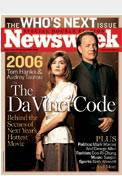 The BIG MOVIE of 2006! Now Newsweek will tell you all about it on the Eve of Christmas 2005! Can anyone believe it was "just a coincidence" that the movie based on the book (the exciting, well-written but utterly stupid) that has generated more head-scratching by the Biblically illiterate gets a front cover a week before Christmas? Come on, Newsweek, couldn't you be a little more subtle?
The BIG MOVIE of 2006! Now Newsweek will tell you all about it on the Eve of Christmas 2005! Can anyone believe it was "just a coincidence" that the movie based on the book (the exciting, well-written but utterly stupid) that has generated more head-scratching by the Biblically illiterate gets a front cover a week before Christmas? Come on, Newsweek, couldn't you be a little more subtle? The da Vinci Code is a anti-Christian, anti-faith frontal assault. Others have done a far better job than I in picking clean its paltry bones. See, for example Mark D. Roberts:
Review: The Da Vinci Code is Truly Fictional
Original post date: December 22, 2003
Everywhere you turn these days somebody is talking about The Da Vinci Code by Dan Brown. It has made headlines and has received cover stories from major magazines. The book is a fairly typical thriller, with plenty of intrigue, action, murders, and conspiracies. None of this is particularly noteworthy. But The Da Vinci Code has received an incredible amount of attention in the secular media because it purports to reveal secrets about Jesus Christ, most of all his secret marriage to Mary Magdalene, by whom he supposedly fathered a child, whose lineage continues to this day. The novel seems to be informed by scholarly study of the New Testament and early Christian history, and in a few points it is. There actually are a few second-century writings, called gospels, in which Mary Magdalene plays a small role, though never explicitly as Jesus' wife. (For a detailed look at this non-canonical evidence, see my article, "Was Jesus Married?") Nevertheless, much of the apparent scholarship in The Da Vinci Code is as fictional as the main characters.
One of these fictions, which is often found in so-called non-fiction books on Jesus, is the idea that the divinity of Christ was a late addition to his résumé. The earliest Christians, so the story goes, knew that Jesus was a human being, and only a human being. He was an inspired teacher, maybe even a healer, but certainly not divine. The deification of Jesus came decades or, as in The Da Vinci Code , centuries after his death, and it involved rejection of the earliest historical records of Jesus which portrayed only his humanness.
Theological implications aside, whether you believe in Christ or not, what I've just related is historical bunk. It's nonsense. It doesn't stand up to the evidence of history. All you need to do is to read the New Testament, most of which was written by monotheistic Jews within fifty years of Jesus' death. There you find that Jesus was believed to be God. You might look, for example, at John 1:1-18 and Philippians 2:11-16.
The evidence that early Christians believed in Jesus' deity is overwhelming. He wasn't deified by Johnny-come-lately fourth-century Christians, but by his earliest followers, who were faithful Jewish monotheists. From a theological point of view, they could have been incorrect, of course. But my point here is a historical one. Belief in the deity of Jesus is as old as Christianity itself. All theories to the contrary, including that of The Da Vinci Code, are fiction.
If you read The Da Vinci Code, just remember that it's fiction, thoroughgoing fiction. And if you'd like more information on early Christian views of Jesus, I'd point you to my own book, Jesus Revealed. I go into all of this in much greater detail there.
Source: http://www.markdroberts.com/htmfiles/archives/12.21.03-12.27.03.htm#davinci
I have a feeling I've got a lot of da Vinci blogging to do this winter and spring. Fortunately, I worked up a 90 minute seminar on Dan Brown and his book of renown about a year and half ago, which I will be bringing out of storage. For those of you in the Los Angeles area, I will be doing the seminar again this spring, and I'll let you know about it well in advance.
1 comment:
Glenn,
Congrats on blogging on this important topic. I have been collecting every book, article, and graphic available on the da Vinci Code since hearing that Hanks would star in the movie. We will both be doing seminars on this heresy.
Post a Comment